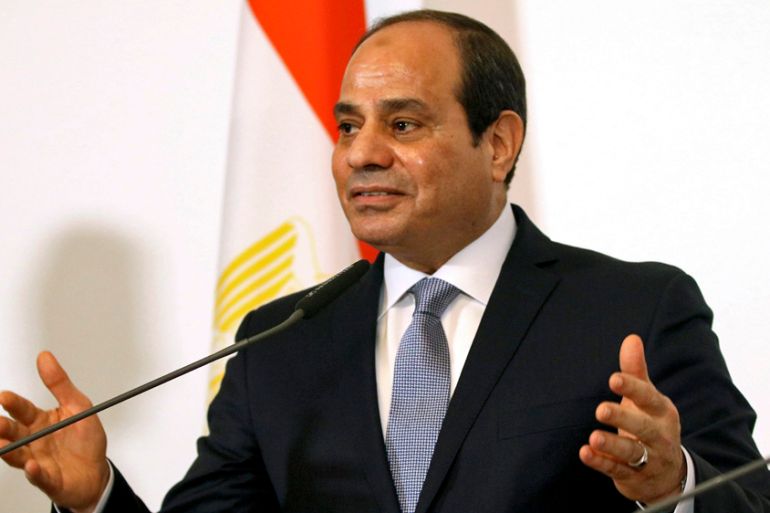‘Brutal campaign’, says press group as Egypt arrests journalist
Local journalist at a major newspaper arrested on ‘terror’ charges, a move sharply condemned by press advocacy groups.

Egyptian officials have arrested a journalist at a major newspaper on “terrorism” charges, his lawyer said, a move a global press advocacy group called a “brutal campaign” against journalists in the country.
Security officers burst into the home of Haisam Hasan Mahgoub in the capital of Cairo earlier this week, confiscating his phone and arresting him, lawyer Karim Abdelrady said.
Keep reading
list of 3 itemsAl Jazeera’s Mahmoud Hussein held in Egypt prison for 3 years
Egypt urged to release Mahmoud Hussein amid outbreak
Mahgoub, a regular correspondent at the independent Egyptian daily, Al-Masry Al-Youm, was questioned by prosecutors on Wednesday and detained on charges of joining and financing a “terrorist group” as well as spreading “fake news” that threatens national security, Abdelrady said.
The prosecutors did not specify what constituted “fake news”.
Another journalist, freelance photographer Moataz Abdel Wahab, faces charges in the same case, Abdelrady added.
Egyptian officials have increasingly deployed the vague accusation of “fake news” to silence and jail critics in the government’s sweeping and often indiscriminate crackdown on dissent.
Among dozens of media workers imprisoned in Egypt is Al Jazeera’s Mahmoud Hussein, a Doha-based journalist who was arrested in 2016 during a visit to his family in Cairo.
He has been detained without charge for more than 1,200 days, and there are concerns for his health during the coronavirus pandemic.
Alaa Abdelfattah was re-arrested in #Egypt in September 2019. Recently, his family posted on social media saying that his "life is in danger."
Today, on #InternationalDayOfFamilies, CPJ recognizes all the families of imprisoned journalists. No journalist should be imprisoned. pic.twitter.com/qiqHb5f9gG
— Committee to Protect Journalists (@pressfreedom) May 15, 2020
‘Brutal campaign to silence journalists’
In a statement emailed to Al Jazeera, the International Press Institute (IPI) criticised Egypt for Mahgoub’s arrest, describing it as part of a “brutal campaign of President Abdel Fattah el-Sisi to silence critical journalists”.
“The Egyptian government continues to brazenly violate press freedom by arresting journalists, raiding media outlets and blocking news websites to stifle criticism, while the international community has turned a blind eye to the harassment of journalists in the country,” IPI director of advocacy Ravi R Prasad said.
“The international community should hold Egypt’s authoritarian regime accountable for the violation of human rights.”
The IPI said Egypt has waged an “aggressive campaign” against the independent media, with more than 60 journalists behind bars in the country.
The Committee to Protect Journalists, a New York-based watchdog, linked Mahgoub’s arrest to a clampdown that has accelerated in the shadow of the coronavirus pandemic, noting that he had recently covered human interest stories about the health crisis.
“While some governments worldwide pardon prisoners during the time of COVID-19, Egypt is determined to keep its prisons full of journalists instead of letting them cover the pandemic and other news events freely,” said Sherif Mansour, the group’s Middle East and North Africa coordinator.
Egypt’s interior ministry did not immediately respond to requests for comment.
Since coming to power in 2013, el-Sisi has sought to quash opposition, branding his critics as “terrorists” and forcing news outlets to follow the official line or disappear.
Last week, el-Sisi approved amendments to the country’s emergency law, citing the coronavirus, with officials claiming the new measures were needed to address the legal “vacuum” caused by the outbreak.
The government is using the COVID-19 emergency to further tighten its grip, rights groups say.
In March, Egypt expelled a correspondent for the United Kingdom newspaper The Guardian over an article that indicated the coronavirus infection rate might be higher than officially reported.
Over a dozen people have been detained or slapped with steep fines over social media posts or reporting about the outbreak, according to Amnesty International.